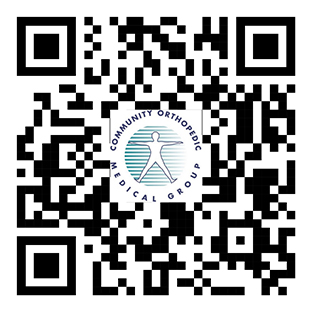Orthopedics is the medical specialty that focuses on injuries and diseases of your body's musculoskeletal system. This complex system includes your bones, joints, ligaments, tendons, muscles, and nerves and allows you to move, work, and be active. At COMG our orthopedic specialists are trained either in orthopedic surgery or physical medicine and rehabilitation (physiatry).
Orthopedic specialists manage problems of the musculoskeletal system. This involves:
- Diagnosis of your injury or disorder including physical exams, lab work, imaging, and electro diagnostics
- Treatment with medication, exercise, surgery, injections or other treatment plans
- Rehabilitation by recommending exercises or physical therapy to restore movement, strength and function
- Prevention with information and treatment plans to prevent injury or slow the progression of diseases
While orthopedic specialists are familiar with all aspects of the musculoskeletal system, many orthopedists specialize in certain areas, such as the foot and ankle, spine, hip or knee. They may also choose to focus on specific fields like pediatrics, trauma or sports medicine.
Education and Training
Your orthopedic specialist is a medical doctor with extensive training in the proper diagnosis and treatment of injuries and diseases of the musculoskeletal system. Your orthopedic specialists at COMG completed up to 14 years of formal education.
- Four years of study in a college or university
- Four years of study in medical school
- Four to Five years of study in orthopedic surgery or physical medicine and rehabilitation residency at a major-medical center
- One to two optional years of fellowship training to gain greater expertise in a specific area of orthopedics
After establishing a licensed practice, your orthopedic specialists demonstrated mastery of orthopedic knowledge by passing both oral and written examinations given by Medical Board governing the specialty.
Each year your physicians also spend many additional hours studying and attending continuing medical education courses to stay up-to-date in current orthopedic knowledge and skills.
Your Doctor's Visit
Your visit will start with a personal interview and physical examination. This may be followed by diagnostic tests such as blood tests, X-rays, or other tests.
Your orthopedic specialist will discuss your diagnosis and available treatment options with you and help you select the best plan to help you to live an active and functional life.
Surgical Treatment
If surgical treatment is recommended, our orthopedic surgeons perform numerous types of surgeries. Common procedures include:
- Arthroscopy -- a procedure using special cameras and equipment to visualize diagnose and treat problems inside a joint. - View Video
- Fusion -- a "welding" process by which bones are fused together with bone grafts and internal devices (such as metal rods) to heal into a single solid bone. - View Video
- Internal Fixation -- a method to hold the broken pieces of bone in proper position with metal plates, pins or screws while the bone is healing. - View Video
- Joint Replacement (partial, total and revision) -- when an arthritic or damaged joint is removed and replaced with an artificial joint called a prosthesis.
- Osteotomy -- the correction of bone deformity by cutting and repositioning the bone. - View Video
- Soft tissue repair -- the mending of soft tissue, such as torn tendons or ligaments. - View Video

